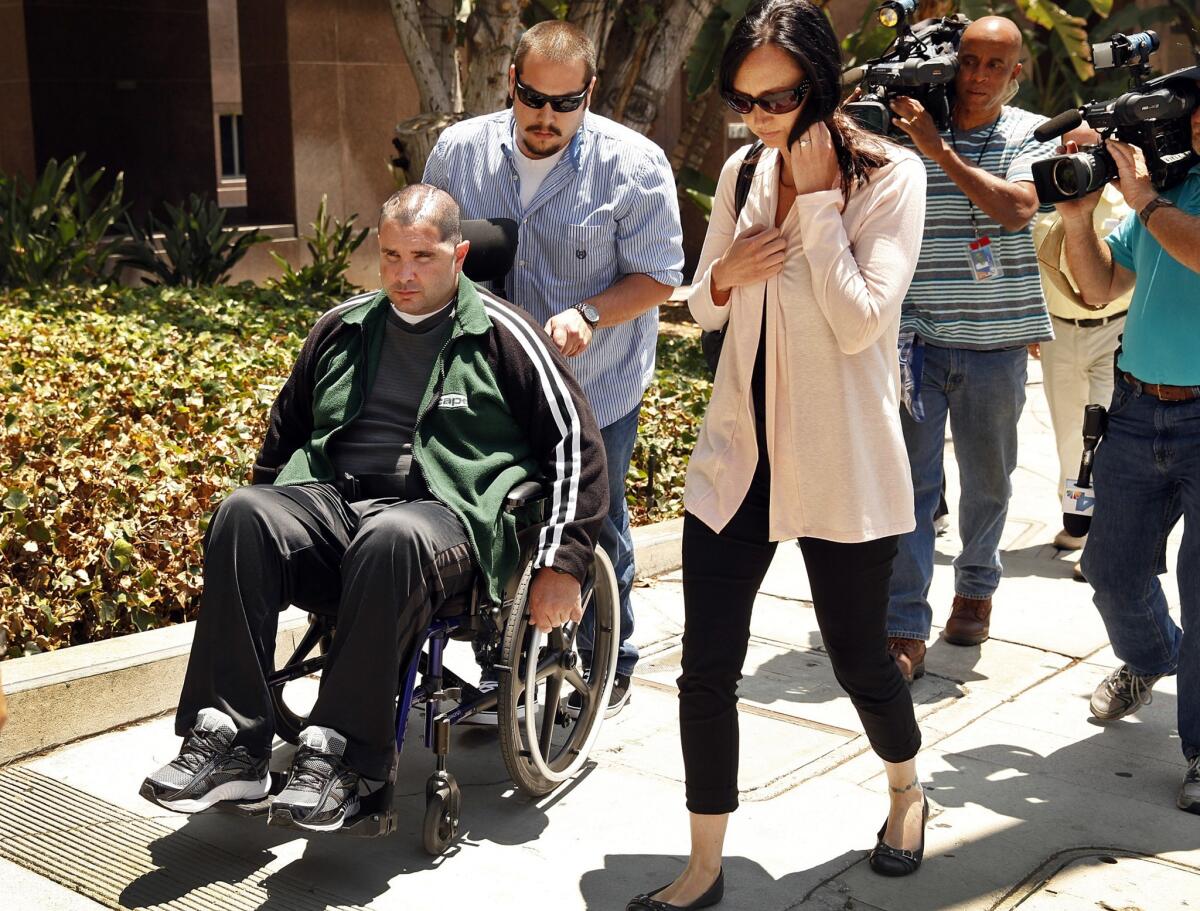MLB found stadium security inadequate, former Dodgers executive says

- Share via
In the wake of Bryan Stow’s beating, Major League Baseball sent a letter to the Los Angeles Dodgers that said security at its stadium was believed to be insufficient, a former Dodgers executive testified Friday.
Peter Wilhelm was the chief financial officer for the Dodgers when they took on the San Francisco Giants on March 31, 2011. The private security bill for the day was $66,604, the highest amount ever spent for a Dodgers opening day. Wilhelm called the vibe of the crowd “energetic.”
But after the attack on Stow — which left him with skull and brain injuries — MLB notified the Dodgers in June 2011 that the organization was taking a closer look at Dodger Stadium.
MLB officials “took a position that they felt the security was inadequate,” said Wilhelm, who now works for former Dodgers owner Frank McCourt’s investment firm McCourt Global.
A month later, MLB published a report titled “Dodger Stadium Assessment,” according to a motion filed earlier this year by the plaintiffs that accuses the defense of hiding the “key document from Major League Baseball which points out all of the deficiencies that existed.”
The report has not been introduced into evidence in the civil trial that accuses the Dodgers and McCourt of negligence in Stow’s assault. But the motion quotes portions of the report, in which MLB refers to “a culture of apathy and indifference” among the Dodgers’ game-day staffers and a deterioration of crowd behavior stemming from the decrease in uniformed officers in the stadium.
By 2011, the Dodgers had relied increasingly on private security guards wearing polo shirts and reduced its uniformed off-duty LAPD officers — a transition the plaintiffs contend created an environment that lacked deference to authority.
But a sports facility and event management consultant paid by the defense said there is no industry standard when it comes to the number of uniformed security guards that arenas have on-hand and added that the Chicago White Sox have no local law enforcement patrolling their stadium.
Bill Squires, who returned to the stand Friday and continued to praise Dodger Stadium’s practices, noted that the facility follows a state law that does not permit beer vending in the seating area as well as enforces a ban on tailgating and drinking in the parking lots.
“I don’t know of another facility in the country that does that,” said the one-time vice president and general manager for Giants Stadium in New Jersey.
The Dodgers’ attorney, Dana Fox, asked Squires to come up with the proper number of security guards that would have prevented Stow’s attack.
“It’s just hard to speculate, there’s just too many variables,” Squires said.
Several witnesses have testified that no ushers or security guards were around to witness one of Stow’s attackers inebriated and harassing patrons during the game. Stow’s attorneys have argued that Louie Sanchez, one of the two men who pleaded guilty to the attack earlier this year, should have been ejected from the game long before he assaulted Stow in the parking lot.
But Squires surmised that Sanchez, who was driven to the game by his sister, would probably still have encountered Stow.
“His sister may have stayed to watch the remainder of the game, instructed him to go to the car and see him after the game,” Squires said. “If that was the case, the time frame wouldn’t change.”
During cross-examination, attorney Thomas Girardi pressed Squires to say that the two security guards assigned to Parking Lot 2 should have been in position during the attack on Stow.
“They didn’t get there as quickly as I think we would all like them to be there,” Squires finally said.
The attorney also questioned Squires’ statement that being ejected wouldn’t have changed Sanchez’s actions.
“How about the other 92 people that got thrown out? Did they go assault anybody?” Girardi asked.
“I can’t answer that,” Squires said.
A criminologist later testified that little could have been done that night to deter Sanchez, who was “a combination of alcohol impairment and retaliation-fueled anger, both of which produce gross insensitivity of risk.”
Bruce Jacobs, a professor of criminology at the University of Texas at Dallas, said that Sanchez was “driven to restore respect and honor in light of an affront” made by Stow. Previous testimony has revealed that in the parking lot, Stow, a paramedic, was frustrated with taunts from Dodgers fans and said “I hope they code,” referring to cardiac arrest.
“Essentially the offender becomes a ticking time bomb and the only thing that’s going to extinguish the fuse is vengeance,” Jacobs said.
Stow’s attorney, David Lira, pointed out that Jacobs had never worked in law enforcement and had a mostly academic career. He also got Jacobs to admit that the integrity of the parking lot had been jeopardized by the absence of the two assigned guards.
The civil lawsuit was filed on behalf of Stow and his two children. Attorneys have advocated for about $50 million in total damages, which includes past and future care and pain and suffering.
Twitter: @corinaknoll
More to Read
Sign up for Essential California
The most important California stories and recommendations in your inbox every morning.
You may occasionally receive promotional content from the Los Angeles Times.











